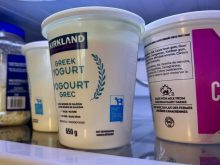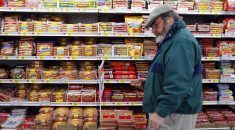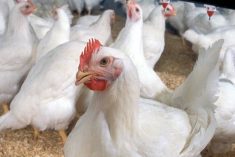“It’s the precedent issue that’s most alarming.”
– PENNY KELLY, MEF
Manitoba’s supply management producers are still in the dark about a new provincial levy on quota transfers, despite asking for an explanation.
“We’re going to have to have some more discussions so we can better understand exactly where it’s coming from,” said David Wiens, Dairy Farmers of Manitoba chairman, after meeting with the province last week.
The NDP government surprised the industry this spring by announcing a surcharge on quota sales and purchases.
Read Also

Students push for Manitoba road upgrades
Manitoba’s lack of higher-rated RTAC roads creates irritating highway detours and weight restrictions for farmers, University of Manitoba students told KAP.
The measure in the March 23 provincial budget imposes a two per cent levy on the value of successful quota transfers for dairy, eggs and poultry.
The first of its kind in Canada, it opens the door for similar charges on other agricultural products, said Penny Kelly, Manitoba Egg Farmers general manager.
“Where does it stop? What’s to prevent a tax on local processed foods?” Kelly asked.
“It’s the precedent issue that’s most alarming.” The dairy-, egg-, chicken-and
turkey-marketing boards, along with Keystone Agricultural Producers, presented their concerns to Struthers April 26. The two sides agreed to meet again. A date has not been set.
Asked if Struthers indicated a willingness to reverse the policy, Wiens couldn’t answer.
“I wish I could say that. I don’t know.”
A main objection is that the levy takes money out of the industry and transfers it to provincial coffers with no benefit to farmers.
“It’s not like it’s a fee for some kind of service rendered,” said Kelly.
Keystone Agricultural Producers at a recent general council meeting passed a resolution opposing the levy. One delegate called it a “blatant tax grab.”
Had the levy been in effect last year, it would have extracted over $1.1 million from Manitoba’s supply-managed sectors, based on the value of last year’s quota exchange transfers. Dairy alone would have been responsible for $1 million, based on the total value of $50 million.
Wiens said the levy particularly inconveniences dairy farmers. Producers often buy or sell small amounts of quota for brief periods to adjust for fluctuations in milk production beyond their daily quota allocations. Having to pay a surcharge each time discourages quota management, he said.
But Wiens said it’s too early to know if the levy will artificially inflate the price of milk quota, which traded at $29,200 per kilogram of butterfat April 1. [email protected]














